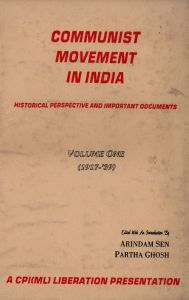 The history of writing communist history in India on behalf of a Communist Party dates back to 1958, when the Amritsar Congress of the CPI appointed a commission for the purpose. The decision remained on a paper, and in June 1963 the Party’s National Council appointed a more competent commission with Dr. G Adhikari as convener. But sharp ideological-political differences had already cropped up inside the party, leading to a vertical split the next year. In the circumstances it was not possible for the commission to work unitedly, though Dr. Adhikari and some others did make some headway. Then in 1971 Dr. Adhikari, entrusted for the task by the National Council of the CPI, edited and brought out volume one of Documents of the History of the CPI covering the period 1917-25. This excellent pioneering work was followed up by subsequent volumes, but the series was left incomplete owing to Dr. Adhikari’s death and other difficulties. Meanwhile, a serialised article entitled “A New Assessment of the History of the CPI” was published during 1968 in Liberation, which would soon become the organ of the undivided CPI(ML); and Subodh Roy of CPI(M) brought out in the 1970s two volumes of Unpublished Documents covering the period 1924-45.
The history of writing communist history in India on behalf of a Communist Party dates back to 1958, when the Amritsar Congress of the CPI appointed a commission for the purpose. The decision remained on a paper, and in June 1963 the Party’s National Council appointed a more competent commission with Dr. G Adhikari as convener. But sharp ideological-political differences had already cropped up inside the party, leading to a vertical split the next year. In the circumstances it was not possible for the commission to work unitedly, though Dr. Adhikari and some others did make some headway. Then in 1971 Dr. Adhikari, entrusted for the task by the National Council of the CPI, edited and brought out volume one of Documents of the History of the CPI covering the period 1917-25. This excellent pioneering work was followed up by subsequent volumes, but the series was left incomplete owing to Dr. Adhikari’s death and other difficulties. Meanwhile, a serialised article entitled “A New Assessment of the History of the CPI” was published during 1968 in Liberation, which would soon become the organ of the undivided CPI(ML); and Subodh Roy of CPI(M) brought out in the 1970s two volumes of Unpublished Documents covering the period 1924-45.
To fulfill the task taken up by our Party some thirty years ago—a task that has become all the more relevant today in the context of closer interaction of the three streams of communist movement in India—the Central Committee of CPI(ML) Liberation decided to publish a five-volume series covering the entire history of the movement from 1917 to the present times. It appointed a seven-member Panel of Editors to collect, edit and supply introductory notes to all important documents. … …
Now for the political approach and method adopted in preparing this series, Volume I in particular. Convinced of the bright future of communism in India despite all the recent setbacks to world socialism, we have sought to visualise the past from the standpoint of the present in the service of the future. This approach has led us to focus the spotlight on the history of concepts — of evolution of political-organisational line and shifts in that line — and to avoid details on personal factors and organisational tit-bits, for with the passage of time these lose much of their relevance while the former remains as instructive as ever. … …
